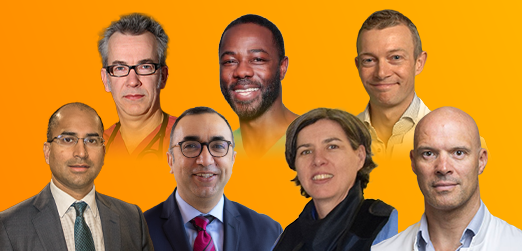- Home
- Vascular Interventions Online 2021 - Aortic - Part 2
Vascular Interventions Online 2021 - Aortic - Part 2
- Intervention
- Vascular
Available Credit:
- 1.00
Course Published On:
Course Expiry Date:

Overview
In this session, Aortic – Part 2, part of Vascular Interventions Online 2021, a leading faculty discuss and demonstrate Thoracic Endovascular Aortic Repair (TEVAR), radiation safety in the modern endovascular practice, neck dilation after standard EVAR, and endovascular navigation with light instead of fluoroscopy.
Vascular Interventions Online (VIO) aims to educate vascular professionals, interventionalists and surgeons who are involved and/or interested in vascular interventional treatment with a focus on Aortic, Venous and PAD / Lower Limb.
Support Statement
This programme is supported by unrestricted educational grants from the following companies. The scientific programme has not been influenced in any way by the sponsors.
- Bentley
- Shockwave Medical
Disclosure
In compliance with EBAC / EACCME guidelines, all speakers/chairpersons participating in this programme have disclosed or indicated potential conflicts of interest which might cause a bias in the presentations.
The Organising Committee/Course Director is responsible for ensuring that all potential conflicts of interest relevant to the event are declared to the audience prior to the CME activities.
Terms & Conditions
Radcliffe Education requires contributors to our CME programmes to disclose any relevant financial relationships that have occurred within the past 12 months that could create a conflict of interest. These will be identified in the faculty section if applicable.
The session of ‘Vascular Interventions Online 2021 – Aortic – Part 2’ is accredited by the European Board for Accreditation in Cardiology (EBAC) for 1 hour of external CME credits.
Each participant should claim only those hours of credit that have actually been spent in the educational activity. EBAC works according to the quality standards of the European Accreditation Council for Continuing Medical Education (EACCME), which is an institution of the European Union of Medical Specialists (UEMS).
Through an agreement between the European Board for Accreditation in Cardiology and the American Medical Association, physicians may convert EBAC External CME credits to AMA PRA Category 1 Credits™. Information on the process to convert EBAC credit to AMA credit can be found on the AMA website.
Instructions to Participants
There is no fee for taking part in this online learning activity.
Activities are designed to be completed within 60 minutes and must be completed by the registered user. Physicians should only claim credits for time spent on the activity. To successfully earn credit, participants must complete the activity in full in the indicated time frame.
To complete the course and claim certification participants must:
-
Read the course outline information supplied and complete pre-test questions if supplied prior to starting the activity. Users must read and study the activity in its entirety before completing the post-test questions.
-
Your results will be automatically saved and if a pass score is achieved (where applicable), you may be eligible to claim credit for the activity and receive a certificate of completion.
Target Audience
- Vascular professionals
- Interventionalists
- Surgeons who are involved and/or interested in Aortic, Venous, and PAD / Lower Limb
Learning Objectives
The overall programme, Vascular Interventions Online 2021, endeavours to best address the following learning objectives:
- To develop an understanding of available treatment strategies for challenging and difficult access procedures
- To update knowledge on the latest technological developments and options
- To gain insight into tips and tricks employed at leading international centres
Module |
Title |
Duration |
Speakers |
|---|---|---|---|
| Presentation | Radiation Safety in the Modern Endovascular Practice | Bijan Modarai (Guys and St Thomas NHS Foundation Trust, London, UK) | |
| Presentation | Neck Dilatation After Standard EVAR: Risk Factors, Dynamics and Clinical Consequence | Hence Verhagen (Erasmus University Medical Center, Rotterdam, NL) | |
| Presentation | Endovascular Navigation with Light Instead of Fluoroscopy: Benefits in Aortic Repair | Joost van Herwaarden (University Medical Center Utrecht, NL) |
Radiation Safety in the Modern Endovascular Practice
Duration:
Speakers: Bijan Modarai (Guys and St Thomas NHS Foundation Trust, London, UK)
Neck Dilatation After Standard EVAR: Risk Factors, Dynamics and Clinical Consequence
Duration:
Speakers: Hence Verhagen (Erasmus University Medical Center, Rotterdam, NL)
Endovascular Navigation with Light Instead of Fluoroscopy: Benefits in Aortic Repair
Duration:
Speakers: Joost van Herwaarden (University Medical Center Utrecht, NL)
Chair
Panelist













